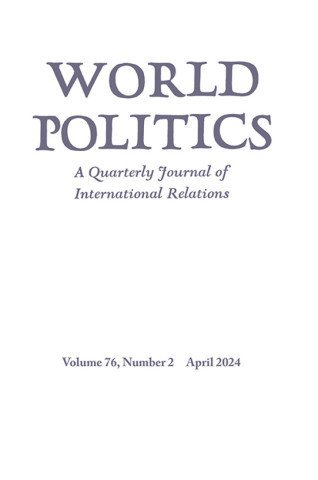一党专政下基层公民社会的崛起:以中国业主协会为例
IF 2.5
1区 社会学
Q1 INTERNATIONAL RELATIONS
引用次数: 0
摘要
传统观点认为,一党制政权本质上敌视公民社会,因为有组织的公民会威胁到政权的政治主导地位。与这一观点相反,作者认为,在一党制下,当真正自愿的民间社会组织能够帮助有效解决经济现代化引起的社会内部分配冲突时,政府可能会容忍,甚至积极推动这些组织。本文以中国的业主协会(hoas)为例表明,当公民经常要求当局干预并裁决他们与房地产开发和管理公司的纠纷时,地方当局更有可能颁布鼓励自组织hoas发展的政策。一项工具变量估计表明,这种关系可能是因果关系,对机制的进一步分析表明,当公民的投诉针对企业而不是政府行为者时,他们最有效地引发了亲华政策。这些发现突出了民间社会组织在街头治理中的重要作用,并对多元因素如何在非自由主义制度中出现提供了细致入微的解释。本文章由计算机程序翻译,如有差异,请以英文原文为准。
The Rise of Grassroots Civil Society under One-Party Rule: The Case of China's Homeowner Associations
abstract:Conventional wisdom holds that one-party regimes are intrinsically hostile to civil society because organized citizens can threaten the regime's political dominance. Contrary to this view, the authors argue that genuinely voluntary civil society organizations may be tolerated, or even actively promoted, by governments in a one-party system when those organizations can help to efficiently resolve intrasocietal distributional conflicts arising from economic modernization. Using China's homeowner associations (hoas) as a case, the article demonstrates that local authorities are more likely to promulgate policies that encourage the development of self-organized hoas when citizens frequently call upon the authorities to intervene and adjudicate their disputes with property development and management companies. An instrumental variables estimation suggests that the relationship is likely to be causal, and additional analyses on mechanisms reveal that citizens' complaints are most effective in eliciting pro-hoa policies when they are targeted at business rather than government actors. These findings highlight an important function of civil society organizations in street-level governance and offer a nuanced interpretation of how pluralistic elements may emerge in nonliberal systems.
求助全文
通过发布文献求助,成功后即可免费获取论文全文。
去求助
来源期刊

World Politics
Multiple-
CiteScore
8.40
自引率
0.00%
发文量
24
期刊介绍:
World Politics, founded in 1948, is an internationally renowned quarterly journal of political science published in both print and online versions. Open to contributions by scholars, World Politics invites submission of research articles that make theoretical and empirical contributions to the literature, review articles, and research notes bearing on problems in international relations and comparative politics. The journal does not publish articles on current affairs, policy pieces, or narratives of a journalistic nature. Articles submitted for consideration are unsolicited, except for review articles, which are usually commissioned. Published for the Princeton Institute for International and Regional Affairs
 求助内容:
求助内容: 应助结果提醒方式:
应助结果提醒方式:


